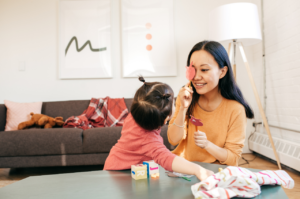
I’ve often been frustrated at how much sleep research focuses on behavioural interventions. I remember back in 2017 hearing Dr Liat Tizotsky speak about her research with the late Professor Avi Sadeh which found that a barrier to improving infant sleep was parental intolerance to crying. I approached her at the end and asked the obvious question: If parents aren’t keen to leave their infants to cry, then why are we spending so much time and energy trying to persuade them, when we could be investing our time more helpfully in finding alternative strategies that were more acceptable to parents. I didn’t get an answer to that question…
But imagine how pleased I was to see a non behavioural based sleep intervention published by some researchers in Canada recently. Keys et al (2022) published the findings of their explanatory sequential mixed methods study which comprised of a randomised controlled trial, followed by interviews with parents which were thematically analysed. Not only was the methodology of this study more robust than I am used to seeing in sleep research, but it was more rounded too. The paper is available in full here.
The researchers noted that mainstream sleep interventions usually focus on behavioural strategies such as extinction (cry it out) which not only are often unacceptable to parents but also separate sleep from the wider parenting experience. This approach does not equip parents with tools to improve sleep or parenting challenges in the future. They also pointed out that alternative sleep research often focuses on maternal sensitivity and overlooks the role of coparents. They proposed that an intervention which integrates parenting skills and coparenting with sleep support could potentially build parental capacity to address sleep as part of wider challenges.
They randomised just over 60 families to the intervention group, and the same number to a control group. The families all had similar characteristics and were blind to which intervention they were receiving. The intervention group were video-recorded while playing with their infant, and then had structured, personalised feedback on their play session during playback with the educator. The feedback included many ways for parents to grow, learn and develop skills of responsiveness, sensitivity, infant cues around engagement and disengagement and subtle signs that the infant needed a break. The control group were video-recorded playing with their infant but had no feedback on the play session (in case you’re lost, this was therefore the only thing that was different between the two groups). Both groups then received some sleep education around normal sleep patterns, bedtime routines and so on.
The researchers found that in the intervention group (called ‘Play2Sleep’) the parents reported significant improvements in problematic sleep, and the symptoms of postnatal depression and relationship dissatisfaction were also reduced.
As part of the qualitative arm of the study, the researchers found that parents were mentally drained by information overload around sleep. They stressed that the information was often conflicting, not evidence based and confusing, especially on the internet. It was hard to find people they could trust to give good information.
Another key finding was that the parents in the Play2Sleep group were immediately able to recognise more subtle infant cues which helped them manage their infant’s emotional state and anticipate their sleep needs more accurately. This led to improved self-efficacy due to being better able to understand their baby and discern sleep/feeding/disengagement cues accurately. They also found that working as a team helped, both in terms of the partners being on the same page, but also fathers being more actively involved with sleep, bedtime, and making decisions about parenting.
Hopefully you can see why I’m so delighted that this study was undertaken! For once, we have a study that genuinely understands that sleep support is not all about sleep behaviour or even sleep education, but about understanding infants on a much more fundamental level. It also found that despite the infants in the intervention group not having a statistically significant improvement in sleep, the parents felt that the sleep was improved. I’ve been saying for years that fatigue is not just caused by sleep deprivation, but by the constant nagging sense that parents are doing it all wrong and feeling underconfident in their parenting ability. What a win for a holistic sleep approach 🙂
If you’d like more support, you’ll probably find my Responsive sleep support class and the Ultimate sleep class for toddlers to tweens informative and empowering.

Leave A Comment
You must be logged in to post a comment.